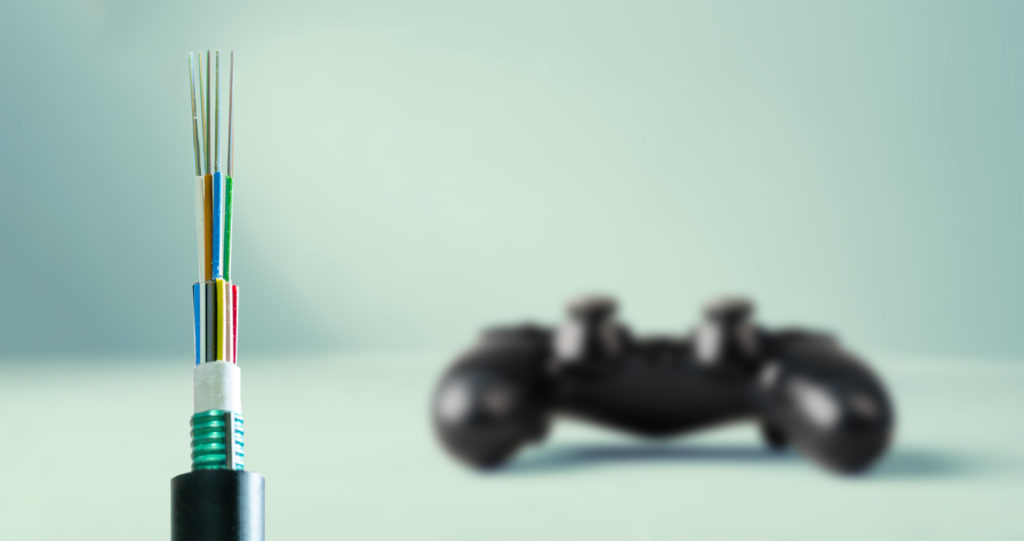
Why Gamers Need Fiber-Optic Internet
Getting eliminated in Fortnite because someone gets the drop on you or reacts faster as you sprint around a corner is just a part of the game, but dying during the game because your internet connection isn’t good enough or drops out at the wrong time? That really hurts—and it hurts your teammates too.
With a fiber-optic connection, things don’t have to be that way. Whether you just game casually or are striving to be a top level esports competitor, here’s what gamers can expect from a fiber technology advantage.
Lower latency so less lag
A lot of people get caught up on speed, but online gaming doesn’t need a blazing fast connection; it needs a rock solid one. Most online games only require upload and download speeds of a few Mbps to run perfectly — but latency is a different story.
Whenever you press a key, click on something, or do anything in an online multiplayer game like League of Legends, your computer sends a data packet to a host server so your actions can be transmitted to all the other players. When it gets there, the server sends a data packet back to your computer with what the other players are doing and the effects of what you did. How long this round trip takes your data packets is the ping or latency of your connection. It’s measured in milliseconds.
The lower your ping, the better. If your latency is 20 milliseconds, your computer is said to have a close-to-realtime picture of what’s going on; the data packets take just two-hundredths of a second, roundtrip. If there’s a lot of latency, however, weird things can happen.
Say you’re playing Fortnite and you and another player shoot at each other at the exact same time. If they have a connection with lower latency, their data packets will reach Epic Games’ servers first so the game will think they shot first. You die, your team mate flames you out, and all because of a few extra milliseconds of lag.
And it’s not just ping you have to worry about. There’s also packet loss and jitter.
Packet loss is the percentage of data packets that don’t make it between your computer and the host server so have to be resent, which adds to your lag. Jitter is how much your latency varies over time. A connection with less jitter is better because when your ping jumps around, data packets can arrive out of order, and things get even weirder. That’s when your opponents will start seeming to jump around or pass through walls. The game can end up pretty unplayable.
Short of camping next to the host server there’s nothing you can do to totally prevent lag, but fiber broadband can get you lower latency and a more stable connection in a few ways:
- Fiber connections use the newest, most modern, most reliable infrastructure, which helps lower latency and prevent packet loss, when compared to older cable or DSL connections.
- Fiber connections aren’t as affected by distance as DSL lines so proximity to an exchange doesn’t matter as much, and there’s less likely to be packet loss or jitter because of interference.
And, while ping is most important for online multiplayer games, it might soon matter more for single player games. Microsoft, Sony, and Google are all working on game streaming services where, instead of buying a game and playing it on your computer or console, you connect to a server and stream the game from whatever device you have at hand.
Even if you only stream solo games like Assassin’s Creed, you’ll want a low latency connection to have the best experience.
Bandwidth for everyone
Growing up, my brother and I shared a low-speed DSL connection that was just fast enough for one of us to game at a time. If he was playing World of Warcraft, then I couldn’t play anything. If I did, both our connections would get too laggy and neither of us would have any fun.
You see, while gaming itself doesn’t need to transfer large amounts of data, there needs to be enough bandwidth in your connection that it doesn’t have to compete with everything else for priority. You can’t let down the rest of your team because someone else is on your Wi-Fi.
If you want to stream to Twitch while you play, live with a roommate who uploads videos to their YouTube channel, or just want to be able to keep playing while your sister watches something on Netflix, then the high-bandwidth of a fiber connection can really help.
After all, it’s only fiber-optics that can deliver up to Gigabit speeds which is usually enough bandwidth for anyone.
Faster downloads are awesome to have
While I’ve mostly been talking about the stability and latency benefits a fiber-optic connection gives to gamers, we can’t forget that high-speed internet is pretty sweet to have—it means everything just happens more quickly.
And, since both Sony and Microsoft’s next generation of consoles have models without disk drives so you have to download every (massive) game, a fast, future-proof fiber connection is only going to get more important. After all, there’s nothing worse than having to wait hours for an update to download before you can play.
Yes, Frontier Fiber with gig speed checks all the boxes
Looking for less lag, reliability of your connection, enough bandwidth to go around and an advantage the minute you step up to your console? It’s all built in to Frontier Fiber. With speeds up to a gig, you’ll start out a winner. Ready for the Frontier Fiber advantage? Check here to see if it’s available at your address.



